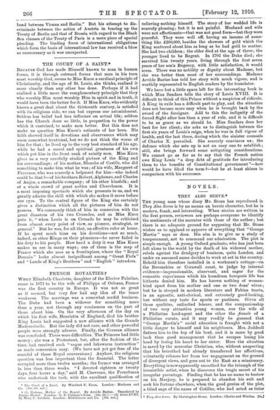FRENCH ROYALTIES.t
WHEN Elisabeth Charlotte, daughter of the Elector Palatine, came in 1671 to be the wife of Philippe of Orleans, France was the first country in Europe. It was not so great SS it seemed, but very few had any idea of the inner weakness. The marriage was a somewhat sordid business. The Duke had been a widower for something more than a year, not through any remissness on the part of those about him. On the very afternoon of the day on which his first wife, Henrietta of England, died his brother King Louis had suggested a new alliance with the Grande Mademoiselle. But the lady did not care, and other powerful people were strongly adverse. Finally, the German alliance was concluded. There were difficulties. The Princess had little money ; she was a Protestant, but, after the fashion of the time, had received such "vague and lukewarm instruction" as made conversion easy. (We have not yet got free of the scandal of these Royal conversions.) Anyhow, the religious question was less important than the financial. The latter occupied more than twelve months ; the former was arranged in less than three weeks. "I devoted eighteen or twenty days, four hours a day," said M. Chevreau, the Frenchman who undertook the task, with the excellent qualification of The Court of a Saint. By Winifred F. Knox. London : Methuen and Co. [10s. 61. net.] t (1) Madame, Mother of the Regent. By Amide Barine. Translated by Jeanne Mairet. London: G. P. Putnam's Sons. [12s. 6d.]—(2) Louis XVII!. By Mary F. Sandars. London: Hutchinson and Co. [16a. net.]
believing nothing himself. The story of her wedded life is scarcely pleasing ; but it is not painful. Husband and wife were not affectionate—that was not good form—but they were peaceful. They were well off, having an income of some- thing like £200,000, besides the showers of gold which the King scattered about him as long as he had gold to scatter. She had two children ; the elder died at the age of three ; the younger lived to be Regent. In 1702 the Duke died; she survived him twenty years, living through the first seven years of her son's Regency, with little satisfaction, it would seem. There was no nobility or dignity about Madame, but she was better than most of her surroundings. Madame Arvede Barine has told her story with much vigour, and is worthily represented to English readers by the translator.
We have but a little space left for the interesting book in which Miss Sandars tells the story of Louis XVIIL It is difficult to think of this Prince without a suspicion of ridicule. A King in exile has a difficult part to play, and the situation does not become more easy when he is brought back by the sword of the foreigner. Add to this the indignity of the forced flight after less than a year of rule, and it is difficult to be as grave as we should be. Miss Sanders does her best for her client ; she asks us to distinguish between the first six years of Louis's reign, when he was in full vigour of health, and the last three, during which the sinister counsels of Charles X. prevailed. She scarcely convinces us ; the defence which she sets up is not an easy one to establish ; still, she brings forward some mitigating considerations. We cannot go as far as to say that the French nation owe King Louis "a deep debt of gratitude for introducing them to the benefits of Constitutional government "—how would he have liked the term P—but he at least shines in comparison with his successor.










































 Previous page
Previous page